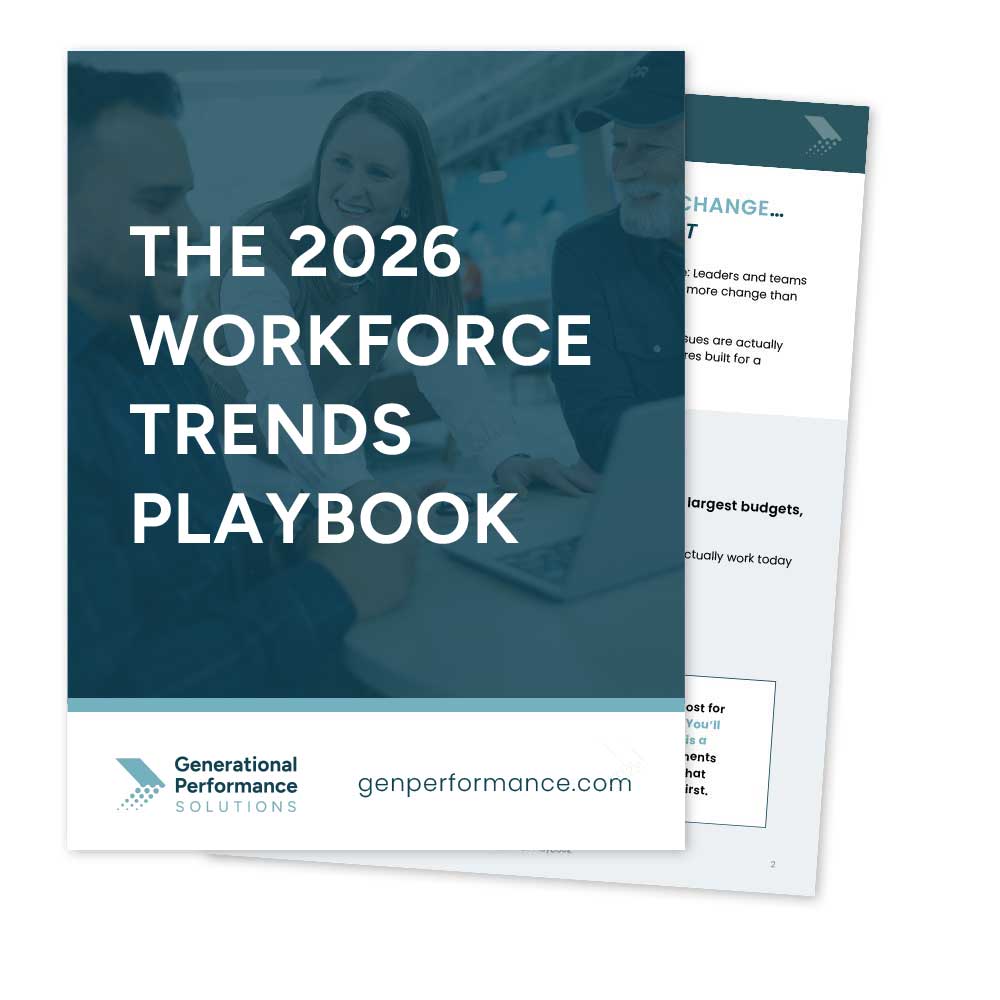How often have you heard the term “employee burnout” lately? If you’re anything like us, then you’ve lost count. It’s in the headlines, it’s in the LinkedIn posts, it’s in employee confessionals on TikTok—and yes, we’re hearing it from business leaders at our own speaking events and workshops. When you’ve been in the workforce for decades and have never heard the term, the current mania around “burnout” can seem contrived and, frankly, a sign of poor work ethic. How seriously should we even take the claims that workers are experiencing burnout?
If you want our opinion—we say “very.”
Yes, It’s Generational.
We know the saying: when you’re a hammer, everything looks like a nail… but it’s absolutely true: we see worker burnout as a sure sign of generational misalignment in the workplace. If we start with the assumption that no generation is inherently lazier than any other, then we can see team performance issues as a clear case of cause and effect.
Let’s look at the causes and effects that are resulting in the diagnosis of “employee burnout.”
Disengagement comes from unclear expectations. If your team has grown to expect unclear and uneven expectations, their desire to be engaged at a high level will disappear. Consider it this way: if you never know exactly how much to study for a test to score an A because the teacher’s expectations change with each assessment, how motivated will you be to spend hours studying? This mentality follows workers long after graduation. Suffice it to say, if you want a team member who asks, “How high?” then you have to make sure that you have a strong, specific answer to that question. If you don’t, they’ll stop asking—and they’ll be less motivated to jump.
Lack of proactivity? That points to unclear ownership. You may be wishing that your team members would show more willingness to take charge and work with a more proactive mindset. However, if they don’t feel any ownership or understanding in the process, they’ll be far more likely to take a back-seat approach to their workload. As Brené Brown has recently pointed out, Gen Z is the generation who wants a “Why?” when given a task, procedures, or policies. So, what may seem combative is actually a desire for ownership. If they’re let in on the “why” behind the company’s choices, they can understand them and therefore feel like a true, informed player. Better yet, ask for their input on any decisions you can, and allow them to be part of the process.
If you’re seeing general performance lag, it might be time to reevaluate the ways you reward your team. Keep in mind that motivation is directly impacted by anticipated reward—and many members of the workforce today are feeling less “rewarded” than those who came before them. Research shows that younger generations are struggling to afford homes, and even those who are homeowners feel less financially secure. Before you write off their concerns, consider the volatility of the real estate market, stock market, and job market over the past decade. For many younger team members (even those who have been able to afford a home), the majority of their investments are tied up in non-liquid assets, and the worth of those assets has been abnormally unstable as of late.
Additionally, keep in mind that millennials came of age during the Great Recession and are attempting to establish themselves financially today, which means that they’ve only known adulthood during economic uncertainty—and the same can be said for Gen Z, who entered the workforce during Covid-19. Even if you see their compensation package as generous, they may feel financially pinched. And if salary and benefits are not adding up to enough of a reward to reduce their anxieties, then their motivation to perform at a high level is going to be impacted.
Getting from Burned Out to Activated
The big takeaway here? The causes and effects of employee burnout are nuanced. Even though all generations are, in general, taught to “work hard” and “hustle”—what that looks like for each generation is different, and it’s psychologically impacted. It takes a strong amount of Generational Intelligence (and a desire to listen and learn!) to best understand your team’s lack of motivation. Here are just a few ways to start activating your team:
- Get curious. If you’re reading this, you’re already halfway there! Truly, though, you can’t know what’s impacting your team’s motivation if you don’t ask (and no, this isn’t a question for an all-hands meeting – it’s a one-on-one conversation where transparency is encouraged). It’s important to approach these conversations with an open mind—it’s not “why are you burned out?” but rather “are there ways our expectations, systems, and policies can improve?” Our keynotes are designed to wake up your organization—fast. If you’re seeing disengagement, misalignment, or culture fatigue, this is your first move to spark curiosity and start these important conversations.
- Train your leaders. Anyone who’s led a burned-out team knows: it spreads quickly, and it heals slowly. That’s why a train-your-leaders approach works best—it avoids a band-aid solution that sounds like lip-service to your team, and it ensures that there is *continual* follow-through happening at multiple levels, which is how genuine trust is achieved. Our Expectation Alignment Lab does just this through action-based solutions that create new norms among your leadership to eliminate misalignment, restore trust, and unlock your team’s potential.
- Rinse and repeat. Remember that the core of your team is about relationships (which is why EQ—and GQ—are such valuable forms of intelligence in the workplace). While we often try to separate the personal from the professional, our work does impact our thoughts, emotions, and behaviors, and the relationships we form in the workplace matter. If relationships take consistent work, then you can expect strong collaboration and motivation in your workplace to need that consistency as well. Don’t expect a quick or single-touch solution; instead, keep your finger on the pulse of your team—and you might even find that your own motivation is improved.
Did you like this week’s post? Then you might like these posts below.
Transforming Talent Retention: The Benefits and Wellness Report
How to Get Your Team to Show Up to Work On Time
What’s Next?
If your team is navigating generational friction, stalled performance, or culture misalignment—it’s time to take action.
At GPS, we’re on a mission to help organizations unlock clarity, communication, and performance across every generation. And we don’t just talk about results—we deliver them in 90 days or less.
Let’s bring out the best in your people.
Connect with us today and start driving results that last.

